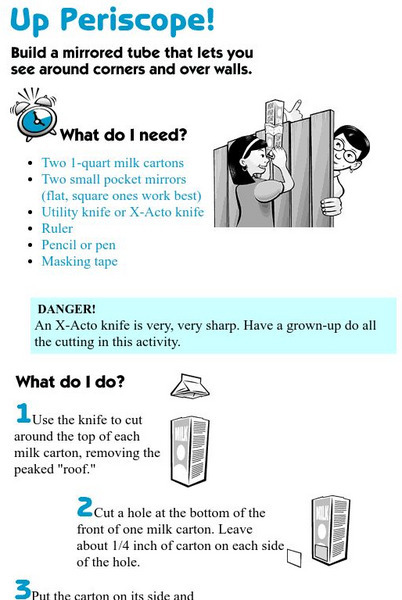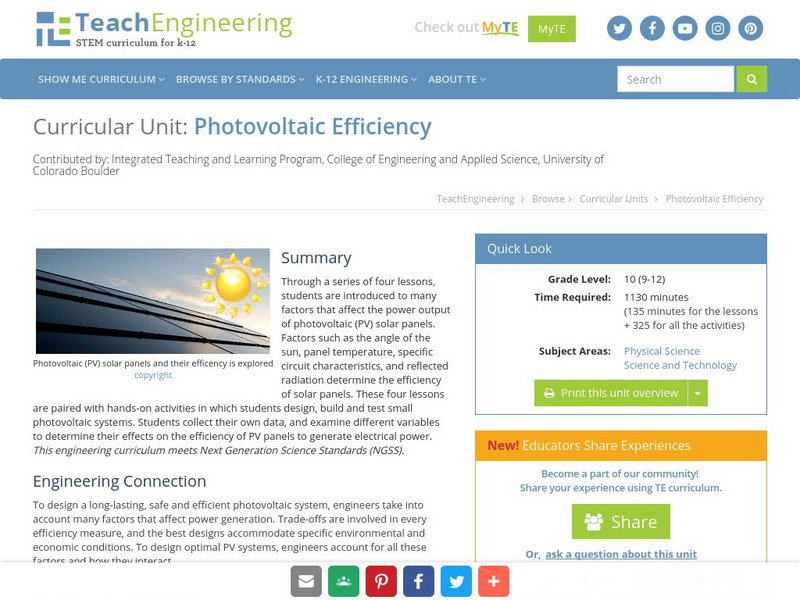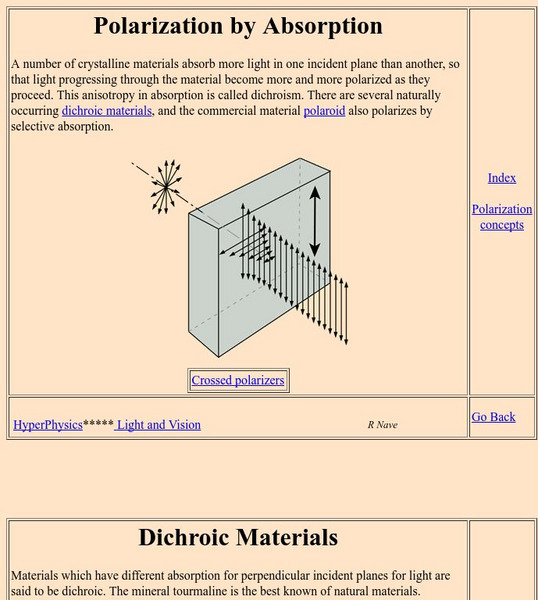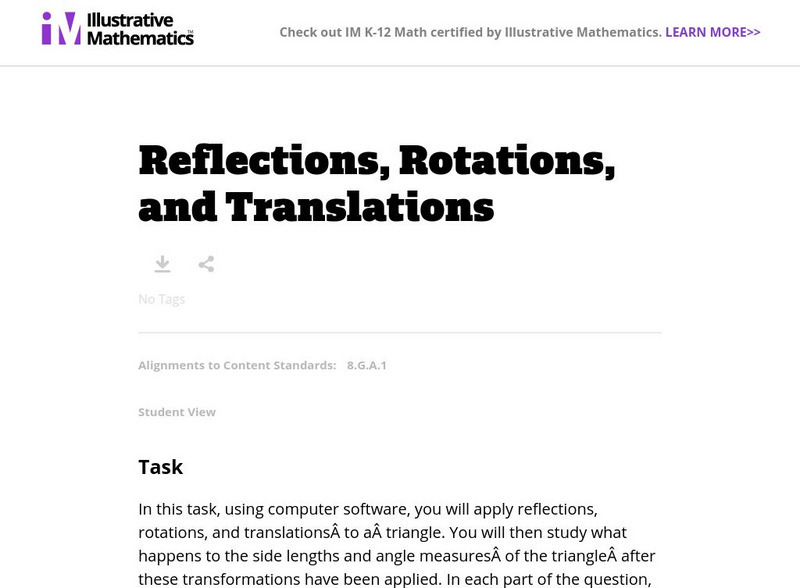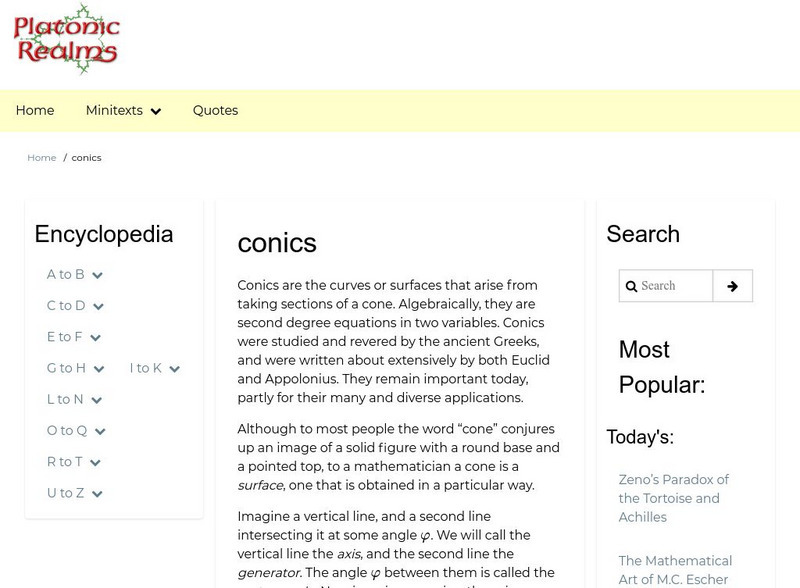Hi, what do you want to do?
Teachers TryScience
Teachers Try Science: Where There's Light, There's Hot Food!!!
This unit helps students learn to apply the concept of solar energy conservation. They are introduced to angles and their effect on the amount of light reflected, and they will also design, construct, manipulate, critique, evaluate and...
Texas Instruments
Texas Instruments: Finding the Shortest Path
Students discover the shortest distance light travels from an object to the human eye, as the light from the object reflects off a single mirror. In the process they learn about reflection in a line, congruent angles, angle bisectors,...
Exploratorium
Exploratorium: Bubbularium
What colors do you see in a bubble? Why do you see colors in a bubble? Use this site to find out the answer to these questions with this easy experiment.
Exploratorium
Exploratorium: Up Periscope!
Children can look around corners with this homemade periscope. Great instructions at this Exploratorium site on how to build a periscope.
National Council of Teachers of Mathematics
Nctm: Slam Ball
[Free Registration/Login Required] Angles and symmetry are reviewed in this learning game. Students try to identify high-scoring paths by slamming the ball off the sides of the game board and send it on a path that collects the most tokens.
BBC
Bbc: Gcse Bitesize: Why Do Scientists Think That Light and Sound Are Waves?
Light travels as transverse waves and can travel through a vacuum. Sound travels as longitudinal waves and needs to travel through a solid, liquid or gas. Read about the properties of light and of sound, and learn the differences between...
TeachEngineering
Teach Engineering: Photovoltaic Efficiency
Through a series of four lessons, students are introduced to many factors that affect the power output of photovoltaic (PV) solar panels. Factors such as the angle of the sun, temperature of the panels, specific circuit characteristics,...
Georgia State University
Georgia State University: Hyper Physics: Polarization by Absorption
The operation of Polaroid filters on a pair of sunglasses is shown.
Georgia State University
Georgia State University: Hyper Physics: Crossed Polarizers
At this univeristy physics department site, the polarization of light is explained and illustrated. Methods for analyzing light to determine the degree of polarization are stated and explained with equations.
TeachEngineering
Teach Engineering: When Silicon Talks
In this activity, students tackle this aspect of engineering as they solve problems for precise angles and speeds, and predict data output when samples are altered.
Boston University
Bu: Optics: Geometric Optics
Several short descriptions of demonstrations which illustrate principles of geometric optics (many of which focus upon refraction).
Illustrative Mathematics
Illustrative Mathematics: Reflections, Rotations, and Translations
This task uses GeoGebra software, which can be freely downloaded, to explore what happens to the line segments and angles of a triangle when it is reflected, rotated, and translated. Includes printable task sheet for students and a...
Illustrative Mathematics
Illustrative Mathematics: G Co Why Does Asa Work?
In triangles ABC and ABD, we are given that angle BAC is congruent to angle BAD and angle ABC is congruent to angle ABD. Show that the reflection of the plane about line AB maps triangle ABD to triangle ABC. Aligns with G-CO.B.8.
Physics Classroom
The Physics Classroom: Image Formation for Plane Mirrors
Scroll down to Lesson 2 for a tutorial on image formation in plane mirrors. The tutorial from Glenbrook South High School provides lessons on why and how an image is formed, image characteristics for plane mirrors, ray diagrams, plus more.
OER Commons
Oer Commons: Review Quiz
Students reflect on their work and apply what they've learned about the characteristics of geometric figures. Includes a learning game to be played with a partner.
Utah Education Network
Uen: Discovering Ourselves in Literature and Life
This lesson plan, provided by the International Society for Technology in Education (ISTE), encourages students to evaluate literature in a variety of multimedia formats and answer the question, "Who Am I?," Students are then asked to...
Other
Platonic Realms: Conics
This resource provides in depth information on the conic sections. Click on the underlined words for definitions and diagrams.
Varsity Tutors
Varsity Tutors: Hotmath: Graphing Calculator Practice Problems Geometry
Practice using your graphing calculator for Geometry problems. If you get stumped or if you would like to check your work, then select the View Solution button, which is located directly under each problem.
McREL International
Mc Rel: Glue Polymer (Whelmer #15 Learning Activity)
An easy to do activity that investigates the basic principles behind chemical bonding. The activity is written in lesson plan format that meets NSES standards.








